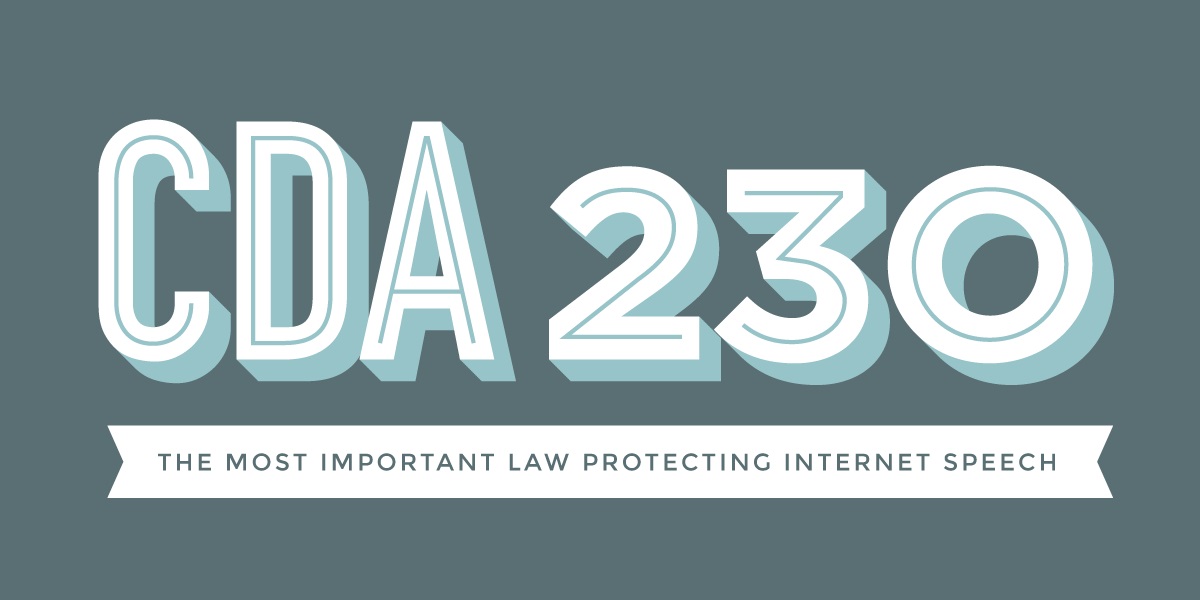With Google and Facebook Under Fire, Section 230 is at a Tipping Point as More Push for Changes
WASHINGTON, June 12, 2019 – New critics of Section 230 of the Telecommunications Act seem to emerge every day on both the political right and the left. The law states that “no provider or user of an interactive computer service shall be treated as the publisher or speaker of any information provided

WASHINGTON, June 12, 2019 – New critics of Section 230 of the Telecommunications Act seem to emerge every day on both the political right and the left.
The law states that “no provider or user of an interactive computer service shall be treated as the publisher or speaker of any information provided by another information content provider.”
These 26 words are widely credited with creating the free-wheeling internet of today. It did this by shielding internet social media “publishers” – otherwise known as internet “platforms” – from liability for the content created by their users.
On Tuesday, conservative firebrand Rep. Matt Gaetz, R-Fla., became the latest on the right to fire at Section 230. At a hearing on Google and Facebook’s impact on journalism, Gaetz floated the possibility of removing or altering the Section 230 protections upon which the technology industry has come to rely.
He also imputed a kind of “fairness” or neutrality standard to which internet platforms must purportedly subscribe if they wish to retain the benefits from liability provided by Section 230.
From the left, Reed Hundt criticizes Section 230 protections as ‘naïve’
But it isn’t just conservatives gunning for Section 230: So are progressives, including Reed Hundt, the author of a recent book critical of what he calls Barack Obama’s “neoliberal” handling of the great recession.
Speaking about his book “A Crisis Wasted: Barack Obama’s Defining Decisions” at a Friday forum hosted by The Capitol Forum, Hundt concurred with some – on the left and on the right – who want to break up Facebook.
Hundt, the first chairman of the Federal Communications Commission under President Bill Clinton, said that he was “wrong” not to oppose Section 230 when it was introduced as part of the Communications Decency Act that passed in 1996.
Hundt contrasted the libel standard that governs traditional publishers like The New York Times. The landmark 1964 Supreme Court decision New York Times Co. v. Sullivan held that newspapers needed to have made a false statement with knowledge or reckless disregard of the truth to be guilty of libel.
It is that standard to which The New York Times is held when it decides to publish “user-generated content” like a letter to the editor. By contrast, Facebook takes much less care in its treatment of content posted by users on its site.

As a result, Facebook and other social media networks permit far more violence and hatred on their web sites than a traditional publisher like The Times would ever countenance on its web site.
Hundt said that the laissez-faire approach of the 1990s, including Section 230, was built around the presumption that “people are good.” Of the time, he now says, “we were very naïve.”
Section 230 took an alternative approach to incentivize online decency
Section 230 was drafted as part of the Communications Decency Act included in the Telecommunications Act of 1996. CDA barred “indecent” material online. It was struck down as unconstitutional in 1997 by the Supreme Court in Reno v. ACLU.
But Section 230 has remained the law of the land. And courts have read its provision to be quite broad in exempting technology companies from liability.
The provisions of Section 230 had originally been proposed as an alternative remedy to an outright ban of indecent content. Indeed, it gave an “interactive computer service(s)” protection for “any action voluntarily taken in good faith to restrict access to or availability of material that the provider or user considers to be obscene, lewd, lascivious, filthy, excessively violent, harassing, or otherwise objectionable, whether or not such material is constitutionally protected.”
Today, with greater scrutiny on the market power and elements of toxic speech emanating from social media, Section 230 is under much greater fire from political and social leaders. And yet courts keep making it difficult to limit its scope and reach.
Courts can’t help themselves in broadly viewing Section 230, so prosecutors want legislative changes
On Friday, for example, the D.C. Court of Appeals cited Section 230 in holding that Google, Microsoft and Yahoo aren’t liable for hosting content posted by known scammers. A group of locksmiths had sued the platforms, claiming that the platforms were effectively engaging in a racket to incentivize legitimate locksmiths to buy ads in order to drive scammers lower on search results.
And that’s probably why state attorneys general are also not letting up in their criticism of Section 230. Last month, 47 of 50 attorneys general joined a letter of the National Association of Attorneys General supporting legislative changes to the law. They say (PDF) that Section 230 precludes state and local authorities from enforcing laws against “sex trafficking and crimes against children.”
The attorneys general continue:
- “We sadly note that the abuse on these platforms does not stop at sex trafficking. Stories of online black market opioid sales, ID theft, deep fakes, election meddling, and foreign intrusion are now ubiquitous, and these growing phenomena will undoubtedly serve as the subjects of hearings throughout the 116th Congress. Current precedent interpreting the CDA, however, continues to preclude states and territories from enforcing their criminal laws against companies that, while not actually performing these unlawful activities, provide platforms that make these activities possible. Worse, the extensive safe harbor conferred to these platforms by courts promotes an online environment where these pursuits remain attractive and profitable to all involved, including the platforms that facilitate them.”
The attorneys general also urged Congress to amend Section 230 in 2013 and 2017. Congress took them up on their request, for the first time, when it made a change in 2018 with the passage of the “Stop Enabling Sex Traffickers Act” and “Allow States and Victims to Fight Online Sex Trafficking Act” (known as FOSTA-SESTA). Passed last year, the measure provides that Section 230 immunity does not apply against enforcement of federal or state sex trafficking laws.
Will changes to Section 230 help big social media companies at the expense of competition?
Some populist Republicans are treating Section 230 as if it were an all-purpose punching bag to go after technology companies and internet platforms.
At a May policy forum flaying Facebook, Sen. Josh Hawley, R-Missouri, said that Section 230 is “predicated on [platforms] providing open, fair and free platforms. If they are not going to do that, but insert their own political biases, then they start to look a lot more like a newspaper, or TV station, but don’t qualify for Section 230.”
At the same time, Hawley took a nuanced view about the possible effects that changes to Section 230 might have on startup companies attempting to compete against giants like Facebook and Google. “We need to make sure that [changes to Section 230 are] not a benefit to incumbency.”
Dan Huff, counsel to former House Judiciary Committee Chairman Bob Goodlatte, R-Va., said at the event that Congress should be more bold in exercising power. The House should use the threat of revising Section 230 as a weapon. This could force Google and Facebook to let the public know how their algorithms highlight particular search results or promote certain items within a user’s social news feed.
Congress should say to these companies: “Unless your make public the grounds on which you keep content off your platform,” we are going to eliminate or drastically scale back Section 230 protections, said Huff.
(Photo of former FCC Chairman Reed Hundt, speaking at The Capitol Forum on Friday, by Drew Clark.)










Member discussion